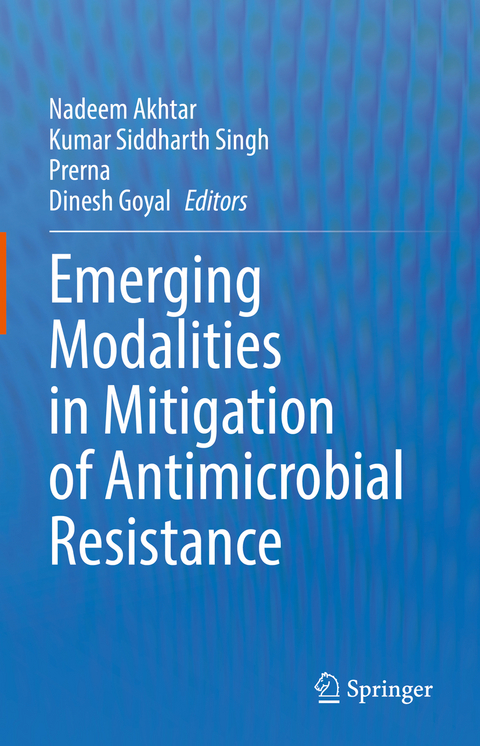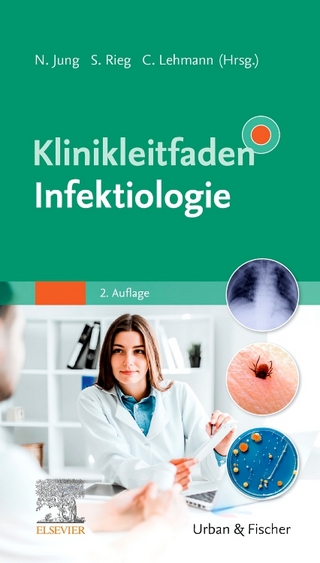
Emerging Modalities in Mitigation of Antimicrobial Resistance
Springer International Publishing (Verlag)
978-3-030-84125-6 (ISBN)
- Presents cutting-edge research and next gen technology through the lens of sustainable methods to combat AMR
- Designed to inform and promote new research and technologies against the growing threat of antimicrobial resistance
- An ideal resource for students, researchers, and industry professionals
Antimicrobial resistance (AMR) is one of the deadliest threats to global public health. This book focuses on dynamics in the landscape of AMR while informing about the latest technologies and strategies to mitigate it. The menace of AMR in different niches, routes of penetration across various domains, socio-economic impact, and the need for a 'One Health' approach in mitigating AMR has been emphasized. Factors involved in AMR, underlying mechanisms, and pharmacometrics in developing antimicrobials are highlighted. Emphasis is given to emerging technologies that are sustainable, scalable, and applicable to the global community, such as big data analytics, bioactive agents, phage therapy, and nanotechnology. The book also explores current and alternative treatment strategies to combat AMR, emphasizing the use of nanoparticles to target pathogens and as a viable alternative to antibiotics.
Nadeem Akhtar, PhD, Department of Animal Biosciences, University of Guelph, Ontario N1G 2W1, Canada. Email: nadeembiotech@gmail.com. Dr. Nadeem Akhtar, Ph.D., currently works at the University of Guelph, Canada as a Research Associate. His current research focuses on biotechnology in animal nutrition, where the main objective is to improve animals' health for a better and disease-free lifestyle. Before the Research Associate role, he has worked as a Post-doctoral Researcher in the Department of Chemical Engineering, University of Waterloo, Canada (2019-2020), and in the Department of Animal Biosciences, University of Guelph, Canada (2015-2019). Dr. Akhtar was awarded a Ph.D. from the Department of Biotechnology, Thapar University, India. He has qualified National Eligibility test (NET-2010) and Graduate Aptitude Test (GATE) in Life Sciences (2010) and Biotechnology (2011). His scientific contributions include more than 22 articles in peer-reviewed international journals, 10 book chapters, and a patent. He reviewed several research articles for reputed journals, including RSC Advances, Journal of Applied Microbiology, Scientific Reports, Poultry Science, and many more.
Dr. Kumar Siddharth Singh, Institute for Microbiology, Leibniz University, Hannover, 30419, Germany. Email: ksid21@gmail.com. Dr. Kumar Siddharth Singh is a trained biotechnologist interested in host-microbe interactions, protein science, molecular microbiology, and omics technologies. He has a Master's degree in Biotechnology from Thapar University, Patiala, India, and Bachelor's degree from Anugrah Narayan College, Patna, India. He obtained a Ph.D. in Animal Biotechnology from ICAR-National Dairy Research Institute, Karnal, India, and developed a potential nutraceutical of probiotic origin to protect against gastrointestinal infections. He is also trained in food safety and quality management, emphasizing regulatory standards relevant to the food and biotechnology industry. He has teaching experience at graduate and post-graduate levels and has many years of mentoring experience. He has industry exposure, more than four years of post-doctoral research experience, and has been awarded many national and international academic awards at different levels of his career from different agencies. He has many scientific articles and reviews to his name and serves as an editorial board member of two journals.
Prerna, Thapar Institute of Engineering and Technology, Patiala, Punjab, India. Email: prerna.biotechnology@gmail.com. Prerna is a Ph.D. Candidate at the Department of Biotechnology, Thapar Institute of Engineering and Technology, India, since July 2013. She received a scholarship under the Government of India scheme TEQIP-II (July 2013- June 2016) and served as a teaching assistant in Biotechnology. Her current research focuses on developing green novel strategies to fabricate various nanoparticles and interests, including nanobiotechnology in medicine, industry, and agriculture. She has optimized gram-scale synthesis of nanoparticles from various plants and alga. She is involved in evaluating strategies employed to remediate industrial wastes with a vision to conserve soil and water, promote water reuse efficiency, and protect soil and water quality in diverse agro-ecosystems. As a member of the interdisciplinary research group, she used different plants, algae, fungi, and bacteria to fabricate ZnO nanoparticles. She has extensive experience in characterizing nanoparticles using different spectroscopic, diffractographic, crystallographic, and advanced microscopic analyses. She served as a resource person for different training programs and workshops at STEP (Science and Technology Entrepreneur's Park), Thapar Institute of Engineering and Technology. She has published two research articles, two book chapters and presented her research in many conferences and symposia.
Dinesh Goyal, Thapar Institute of Engineering and Technology, Patiala, Punjab, India. Email: dgoyal@thapar.edu. Dinesh Goyal, microbiologist graduated from Division of Microbiology, Indian Agricultural Research Institute, New Delhi in 1990. He served at University of Delhi, New Delhi and Thapar Centre for Industrial Research, Patiala before joining Thapar Institute of Engineering and Technology (Deemed to be University), Patiala as a faculty in 2000 and is presently the Professor in the Department of Biotechnology. He did Post-Doctoral Research at the Department of Bioengineering, Tokyo Institute of Technology, Tokyo, Japan during 1993 to 1995 and later underwent two weeks training on Technology Entrepreneurship and Education at Walter A Haas Business School, University of California, Berkeley, online training on Marketing for Incubator managers and entrepreneurs organized by Asia Pacific Incubator's Network (APIN) and accomplished many orientation courses on higher education, human values, IPR and commercialization of technology and innovation.His current interests are in applied microbiology and biotechnology and is focusing on nano-bioremediation and nano-antimicrobials. He has published more than 100 articles, two patents, 14 book chapters, compiled three manuals and guided the research work of 19 Ph.D students, 10 project fellows, B.Tech, 60 M.Sc., and 08 M.Tech. students. He has organized more than thirty-five training programs and workshops in microbiology, biotechnology and entrepreneurship and eight national and one international conference. He was nominated four times (2006-08) as an expert member of National Board of Accreditation (NBA) by All India Council for Technical Education (AICTE) for evaluation and accreditation of B.Tech Biotechnology program. He is also the recipient of prestigious Japanese Govt (Mombusho) Scholarship (1993-95), Fellow of International Congress of Chemistry and Environment (2009), Fellow of Association of Biotechnology and Pharmacy (2010), and Shiksha Rattan Puraskar (2011), Fellow of Association of Microbiologists of India (2012) and Fellow of Institute of Water and Environment (2014).
1Antibiotic resistance threat from food animals to humans and environment: A call for an urgent actionKaruppusamy Shanmugasundaram1,*, Harisankar Singha2, Rajesh Kumar Vaid1 *Corresponding author: shanmuga02@gmail.com
2Antimicrobials in livestock production and its cross-domain dynamicsBishwo B Pokharel**Corresponding author: bbpvet@gmail.co; bishwovet@gmail.com
3Antibiotics, antibiotic residues and resistance dynamics in the environment4Antimicrobials in agriculture and its implications in antimicrobial resistanceArun Goyal*5Role of next generation genomics for surveillance of global antimicrobial resistance 6Modern diagnostic tools for rapid detection of multidrug resistance Nimisha Tehri1,*, Amit Vashishth2, Saurabh Kadyan3, Piyush Tehri4*Corresponding Author: nimmi.tehri15@gmail.com 7Impact of antimicrobial resistance and socio-economic considerations in global worldSunny Dholpuria**Corresponding Author: sunnydholpuria@gmail.com
B: Mode of action of antimicrobials in mitigation of AMR8Natural products as resource for mitigating antimicrobial resistanceMohammed Aslam1,*, Javed Ahmad2, Obaid Afzal3, Aamir Mirza4, Nadeem Akhtar5*Corresponding Author: aslam.universe@gmail.com
9Role of regulatory pathways and action of antimicrobialsSanjana Kumariya1, Rashmi Kumariya2,**Corresponding Author:kumariya.rashmi@gmail.com
10Novel antimicrobial agents and insights into their action and functionVagish Dwibedi1, Santosh Kumar Rath2,**Corresponding Author:santoshcool.rath@gmail.com
11Role of polyphenols as potent antimicrobial agentsAshraf Ali1,*, Giovanni Normanno1, Antonio Parisi2*Corrsesponding Author: ashraf.ali@unifg.it
12Therapeutic application of EndolysinsRajni Kaur1,* *Corresponding Author: rkaur_msc17@thapar.edu
13Antimicrobial peptides and small molecules as antibiotics substitute14Molecular insights into antimicrobial resistance of S. aureus biofilms to develop potential anti-infectivesVanessa Silva1-4, José L. Capelo5,6, Gilberto Igrejas2-4 and Patrícia Poeta1,4**Corrsesponding Author:ppoeta@utad.pt
C: Novel strategies to combat AMR15Antimicrobial activity and therapeutic potential in nanoparticle formulations of plant derived bioactive compounds.Mohamad Taleuzzaman1,**Corrsesponding Author: zzaman007@gmail.com 16Nanotechnology based medicine as future alternative against multiple drugs resistanceMd.Meraj Ansari1,*, Sanyog Jain1, Rehan Khan2*Corresponding author: rajmeraj385@gmail.com
17Nano-cargos Boarded Defensins to Combat Multi-drug ResistanceDivya S Parimi1, Tarun K Bollu1, Chandra S Bhatt1, Imran Uddin1, Anil K Suresh1,**Corresponding author:anil.s@srmap.edu.in
18Implementation of nano-vehicles to disguise and fight multi-drug resistanceTarun K Bollu1, Divya S Parimi1, Chandra S Bhatt1, Imran Uddin1, Anil K Suresh1,**Corresponding author: anil.s@srmap.edu.in
19Silver nanoparticles as potent multi-drug resistant in-corporants in biomedicineImran Uddin1, Divya S Parimi1, Tarun K Bollu1, Chandra S Bhatt1, Anil K. Suresh1,**Corresponding author:anil.s@srmap.edu.in 20Role of gold nanoparticles against bacterial multidrug resistance (MDR): An emerging therapeutic revolutionKaushik Kumar Bharadwaj1, Bijuli Rabha1, Arabinda Ghosh2,* *Corresponding author: dra.ghosh@gauhati.ac.in
21Carbon nanoparticles: A potential cost-effective approach to counter antimicrobial resistanceAfroza Khanam1,* and Firdous Ahmad Khan1*Corresponding author: afrozachem@gmail.com 22Antimicrobial interfaces as augmentative strategy against antimicrobial resistanceSunny Dholpuria1,**Corresponding Author: sunnydholpuria@gmail.com
23Role of copper nanoparticles as antimicrobials: Recent advances and outlook Purnima Khanna1,2, Dinesh Goyal1, and Bhupendrsa Chudasama2,**Corresponding Author: bnchudasama@thapar.edu
| Erscheinungsdatum | 02.02.2022 |
|---|---|
| Zusatzinfo | 30 illus. |
| Verlagsort | Cham |
| Sprache | englisch |
| Maße | 155 x 235 mm |
| Gewicht | 1045 g |
| Einbandart | gebunden |
| Themenwelt | Studium ► Querschnittsbereiche ► Infektiologie / Immunologie |
| Technik ► Umwelttechnik / Biotechnologie | |
| Schlagworte | Artificial Intelligence • Bacteriophage • High-throughput sequencing • Microbial Community • microbial stewardship • multidrug resistance • Nanoparticle • Nanotherapeutics • Novel mitigation technologies • rapid detection • Surveillance |
| ISBN-10 | 3-030-84125-1 / 3030841251 |
| ISBN-13 | 978-3-030-84125-6 / 9783030841256 |
| Zustand | Neuware |
| Informationen gemäß Produktsicherheitsverordnung (GPSR) | |
| Haben Sie eine Frage zum Produkt? |
aus dem Bereich


